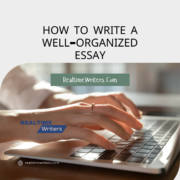Common Mistakes in Essay Writing and How to Avoid Them
Essay writing is a critical skill in academia, essential for conveying complex ideas and arguments clearly and effectively. However, even experienced writers can fall into common traps that undermine their work. In this blog, we’ll explore the most common mistakes in essay writing and how to avoid them, helping you improve your writing skills and produce high-quality essays.
Poor Thesis Statement
A thesis statement is the foundation of your essay, providing a clear, concise summary of your main argument. One of the most common mistakes in essay writing is crafting a vague or broad thesis statement. This can confuse readers and weaken your argument.
Example of a Poor Thesis Statement:
– “Pollution is bad for the environment.”
– This statement is too broad and lacks specificity.
Example of a Strong Thesis Statement:
– “Industrial pollution significantly contributes to climate change by increasing greenhouse gas emissions, which leads to global warming and severe weather conditions.”
How to Avoid It:
Be;
Specific: Make sure your thesis statement clearly defines your argument and the scope of your essay.
Debatable: Ensure that your thesis presents a point that can be argued against, inviting discussion and analysis.
Concise: Keep it focused and to the point, usually one or two sentences.
Lack of Clear Structure
A well-organized essay helps readers follow your argument and understand your points. Common structural issues include lack of a clear introduction, body, and conclusion, or poor logical flow between sections. You may also find it helpful to read this blog on How to Write a Well-Organized Essay.
Example of Poor Structure:
– An essay that jumps from one idea to another without clear transitions or an essay that lacks a proper introduction and conclusion.
How to Avoid It:
– Outline First: Create an outline before you start writing to organize your thoughts and structure your essay logically.
– Use Headings and Subheadings: These can guide readers through your essay and make your argument easier to follow.
– Clear Transitions: Use transition sentences to link paragraphs and sections, ensuring a smooth flow of ideas.
Example of a Transition Sentence:
– “While renewable energy sources are beneficial, they also come with challenges that need to be addressed to maximize their potential.”
Insufficient Research and Evidence
Another common mistake in essay writing is relying on insufficient or unreliable sources. Strong essays are backed by thorough research and credible evidence.
Example of Insufficient Evidence:
– Using only one source to support a complex argument or citing non-academic websites.
How to Avoid It:
– Use Credible Sources: Rely on academic journals, books, and reputable websites. Avoid sources like Wikipedia or personal blogs.
– Diversify Your Research: Don’t rely on just one or two sources. Broaden your research to provide a well-rounded perspective.
– Proper Citation: Always cite your sources correctly to give credit and avoid plagiarism.
Example of Proper Citation:
– (Smith, J. (2020). Climate Change and Renewable Energy. Environmental Journal, 34(2), 123-145.)
Weak Argumentation
Building a strong argument is crucial for persuasive writing. Common pitfalls include making unsupported claims or using logical fallacies.
Example of Weak Argumentation:
– “Renewable energy is the best solution because it is good for the environment.”
– This statement is vague and lacks supporting evidence.
How to Avoid It:
– Support Your Claims: Use evidence and examples to back up your points. Each claim should be supported by data, research, or logical reasoning.
– Avoid Logical Fallacies: Be aware of common fallacies like ad hominem attacks, straw man arguments, and false dichotomies. Ensure your reasoning is sound and logical.
Example of Supported Claim:
– “According to a study by the International Energy Agency (2021), renewable energy sources like wind and solar power have the potential to reduce global carbon emissions by up to 50% by 2050.”
Poor Grammar and Spelling
Grammar and spelling mistakes can distract readers and undermine your credibility. This is one of the most noticeable common mistakes in essay writing.
Example of Poor Grammar and Spelling:
– “Their going to the store to buy fruits.”
– Incorrect usage of “their” instead of “they’re.”
How to Avoid It:
– Proofread Thoroughly: Don’t rely solely on spell checkers. Read your essay multiple times to catch errors.
– Use Grammar Tools: Tools like Grammarly can help identify and correct grammatical mistakes.
– Read Aloud: Reading your essay aloud can help you catch errors and awkward phrasing.
Example of Corrected Sentence:
– “They’re going to the store to buy fruits.”
Inadequate Analysis and Critical Thinking
Strong essays go beyond mere description to analyze and critically engage with the topic. Many writers fall into the trap of being too descriptive.
Example of Descriptive Writing:
– “The Industrial Revolution was a period of great change.”
– This statement is purely descriptive and lacks analysis.
How to Avoid It:
– Ask Questions: Always ask why and how questions to deepen your analysis.
– Compare and Contrast: Look at different perspectives and compare them to add depth to your argument.
– Critical Engagement: Don’t just state facts; analyze them and explain their significance.
Example of Analytical Writing:
– “The Industrial Revolution, driven by advancements in technology and manufacturing, fundamentally altered economic and social structures by increasing production efficiency, which led to urbanization and changes in labor dynamics.”
Overuse of Quotations
Quotations can support your argument, but over-reliance on them can drown out your own voice. This is a common mistake in essay writing that can make your work seem unoriginal.
Example of Overuse of Quotations:
– “According to Smith, ‘Renewable energy is the future.’ As Jones states, ‘It is crucial for sustainability.’ Brown also mentions, ‘Renewable sources are beneficial.'”
– Excessive use of quotes without your own analysis.
How to Avoid It:
– Paraphrase More: Instead of quoting, paraphrase the ideas in your own words and add your analysis.
– Balance Your Voice: Use quotations sparingly and ensure they support rather than replace your own argument.
Example of Balanced Use of Quotations:
– “While Smith argues that ‘renewable energy is the future,’ it is important to consider the challenges of integrating these sources into existing infrastructure.”
Plagiarism
Plagiarism is a serious offense in academic writing. It occurs when you use someone else’s work without proper attribution.
Example of Plagiarism:
– Copying and pasting text from a source without citation.
How to Avoid It:
– Cite Properly: Always provide proper citations for any ideas, data, or text that are not your own.
– Use Plagiarism Checkers: Tools like Turnitin can help ensure your work is original.
– Understand What Constitutes Plagiarism: Be aware of different types of plagiarism and how to avoid them.
Example of Proper Attribution:
– “As Johnson (2021) explains, ‘The integration of renewable energy sources is critical for sustainable development.’”
Ignoring the Prompt
One of the simplest yet most common mistakes in essay writing is ignoring the essay prompt. This can lead to essays that are off-topic or incomplete.
Example of Ignoring the Prompt:
– The prompt asks for an analysis of the economic impacts of renewable energy, but the essay focuses on environmental benefits.
How to Avoid It:
– Understand the Prompt: Read the prompt carefully and make sure you understand all parts of it.
– Stay Focused: Keep referring back to the prompt as you write to ensure you stay on track.
– Address All Parts: Make sure your essay addresses all aspects of the prompt.
Example of Addressing the Prompt:
– “This essay will analyze the economic impacts of renewable energy, focusing on job creation, energy costs, and long-term financial benefits.”
Poor Conclusion
A strong conclusion reinforces your thesis and main points. Common issues include abrupt endings and lack of summary or closure.
Example of Poor Conclusion:
– “That’s all I have to say about renewable energy.”
– This ending is abrupt and lacks a summary or final thought.
How to Avoid It:
– Summarize Key Points: Briefly recap the main arguments of your essay.
– Reinforce Your Thesis: Restate your thesis in light of the evidence presented.
– Provide Closure: End with a strong, final statement that leaves a lasting impression.
Example of a Strong Conclusion:
– “In conclusion, renewable energy offers significant economic benefits, including job creation, reduced energy costs, and long-term sustainability. By investing in these technologies, we can ensure a more stable and prosperous future.”
Conclusion
By being aware of these common mistakes in essay writing and how to avoid them, you can improve your writing skills and produce high-quality essays. Practice, attention to detail, and a willingness to learn from your mistakes are key to becoming a better writer. Remember, the goal is not just to avoid mistakes but to enhance your ability to communicate your ideas effectively and persuasively.
Call to Action
Do you have your own tips for avoiding common mistakes in essay writing? Share your thoughts and experiences in the comments below! Don’t forget to subscribe to our blog for more essay writing tips and resources. For further reading, check out our related posts, such as “10 Essential Strategies for High-Quality Academic Essays.“









